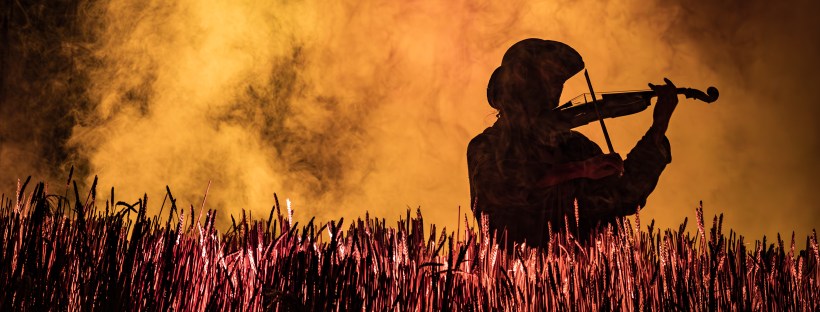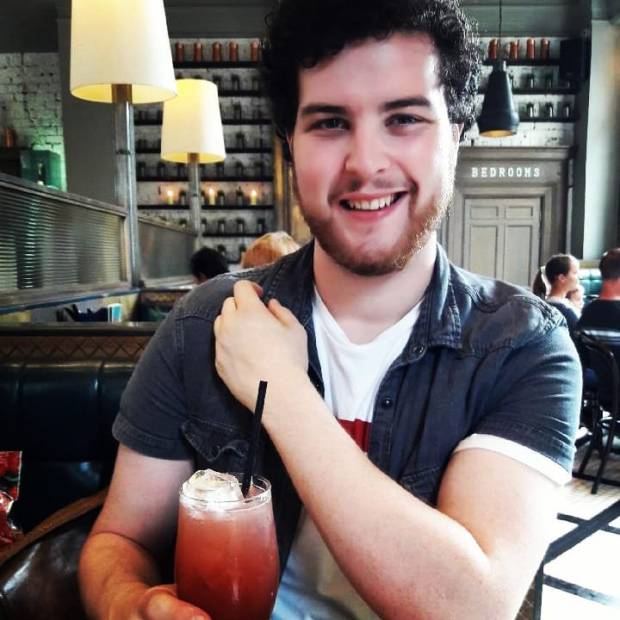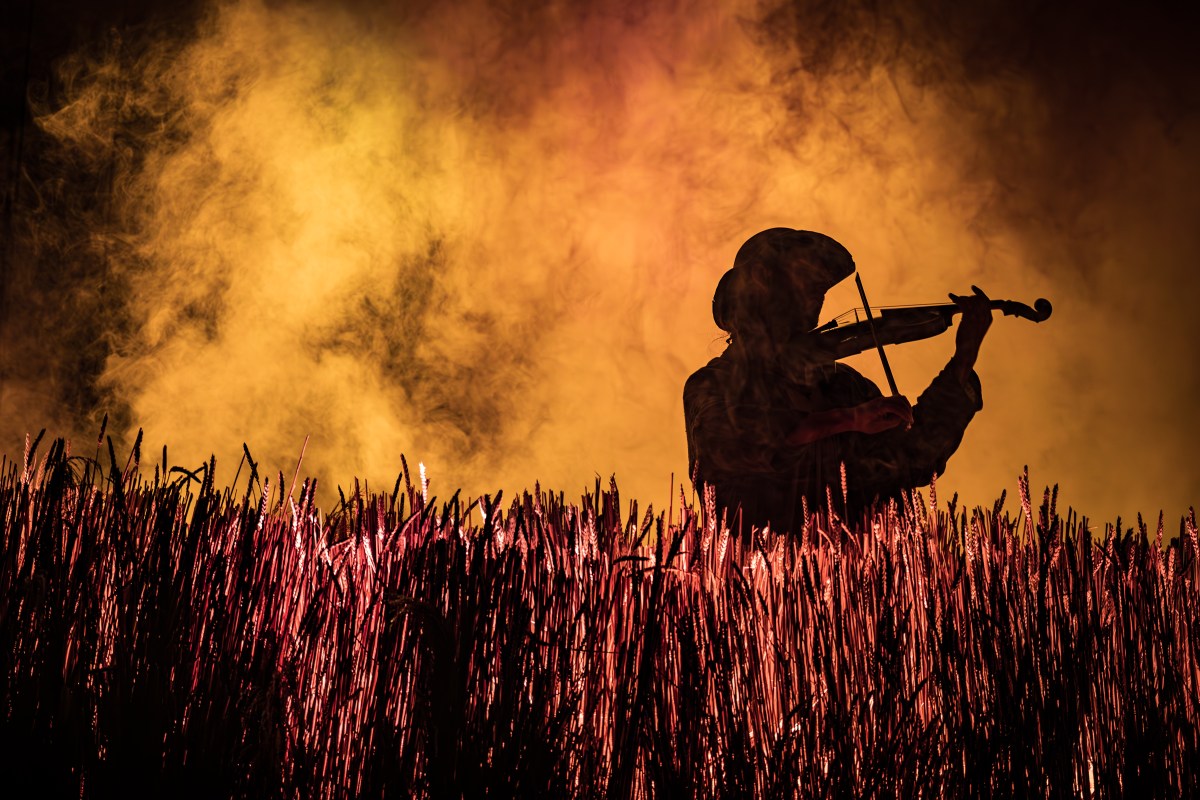Book by Joseph Stein
Music by Jerry Bock
Lyrics by Sheldon Harnick
Directed by Jordan Fein
Review by Dominic Corr
⭐⭐⭐⭐
Rating: 4 out of 5.
Tradition is more than a number here; it’s also the heartbeat of this revival of Fiddler on the Roof, which opened its Edinburgh run to a packed Festival Theatre. Directed by Jordan Fein, this Olivier Award-winning production, fresh from its Barbican triumph, balances reverence and reinvention with remarkable poise. And while the roof may be metaphorical, the emotional stakes are anything but.
Set in the village of Anatevka in 1905, the story follows Tevye, a Jewish milkman, as he grapples with the shifting sands of modernity, faith, and family, yielding to some, resisting to others. Matthew Woodyatt steps into the role with jolly warmth and jocularity, delivering a Tevye who is less bombastic patriarch and wearier philosopher. His rendition of “If I Were a Rich Man” is playful without losing its melancholy, and his final monologue, delivered with aching restraint, is a triumph of direction, adaptation, and performance.
But no Tevya is worth their salt without a sparring partner, and wife, Golde. And tonight, Edinburgh was treated to Jodie Jacobs as a formidable presence, grounding Tevye’s flights of fancy with dry humour and maternal steel. Their duet “Do You Love Me?” is a highlight for the night, a much slower and tender number, funny and quietly devastating. Surrounded on all sides by ailing health, frustrations, a growing resentment to their identity, Tevya faces something more devastating: five daughters. Natasha Jules Bernard makes a firm impression as the eldest, Tzeitel, bringing plenty of spirit and drawing out the most of the character. While Ashleigh Schuman makes a terrific Hodel, a fine balance to Hannah Bristow, whose Chava brings the family to breaking point with their taste in suitor. They all bring distinct textures to Tevye’s daughters, each navigating the tension between tradition and autonomy with clarity and charm.
Captivating, Roman Lytwyniw took up the mantle of the Fiddler for an evening with numerous cast substitutions: each handled with grace, and the ensemble never missed a beat. But it’s the dancing that elevates this production. Julia Cheng’s choreography is eccentric, rooted in folk tradition but pulsing with contemporary energy. The wedding sequence, with its bottle dance and swirling ensemble, is a masterclass in controlled farce. Cheng’s movement direction doesn’t just decorate the story as it drives the narrative, particularly with Tevye’s gradual breakdown of their body – more horse than man: from the stomping defiance of “To Life” to the haunting procession of Anatevka’s final exile, the choreography speaks volumes.
And though tucked at the rear of Tom Scutt’s set, the live band is exceptionally talented. The show’s design is unique, and a continuation – rather than sa trict reinvention of what audiences expect: The musicians are musicians who underscore the drama with infused melancholy and celebratory bursts. It’s the first act closer which hits hardest; a roar of vermillion embers sparking amongst the crops, the smoke looming, pluming into the audience.
The lighting by Aideen Malone plays a crucial role in storytelling. Silhouettes stretch across the stage like memories, and the use of shadow during Tevye’s dream sequence is particularly effective, even intimidating. The palette shifts are rare, from warm candlelight to more monochrome, reflecting the emotional temperature of each scene. The production’s themes of displacement, persecution, and cultural resilience feel painfully relevant. As Anatevka’s residents are forced from their homes, the echoes of contemporary refugee crises are impossible to ignore. Fein’s direction doesn’t labour the point, but the resonance is unmistakable. This is a story about holding on, to faith, to family, to identity, even as the world insists you let go.
If there’s a flaw, it’s in the occasional unevenness of tone. Some ensemble performances lean too far into comedic, even in their attempts to lighten heavier sequences, undercutting the emotional weight of the narrative. A few comedic beats feel overstated, particularly in scenes involving the matchmaker Yente (Beverley Klein), whose broad delivery sometimes clashes with the production’s more nuanced moments.
A surviving, stirring celebration of unwavering tradition and joy, Fiddler on the Roof remains strong. It sings, it dances, it mourns—and it does so with integrity. As dusk settles, and the final notes of “Anatevka” drift into the night air, Fiddler on the Roof leaves behind more than just applause it leaves a reckoning. Fein transforms this classic into something elemental and urgent. In a world still grappling with displacement, division, and the erosion of tradition, this production reminds us that the fragility of home is not just historical, it’s heartbreakingly present. And as Lytwyniw’s fiddler plays on, perched above the stage like memory itself, we are left with a final image: not of endings, but of endurance.

A Stirring Celebration
Fiddler on the Roof runs at The Festival Theatre
Running time – Two hours and Forty minutes with one interval
Photo credit: Johan Persson and Marc Brenner
Review by Dominic Corr – contact@corrblimey.uk
Editor for Corr Blimey, and a freelance critic for Scottish publications, Dominic has been writing freelance for several established and respected publications such as BBC Radio Scotland, The List, The Scotsman, Edinburgh Festival Magazine, The Reviews Hub, In Their Own League, The Wee Review and Edinburgh Guide. As of 2023, he is a member of the Critic’s Award for Theatre Scotland (CATS) and a member of the UK Film Critics.

Like this:
Like Loading…
